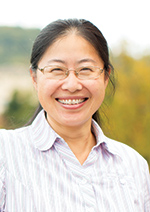Scintillating Investigation: Hayward and Qi Lead New Research Team
Jason Hayward and Hairong Qi have launched a new investigation of advanced organic scintillators, light collection in organic scintillation detectors, and advanced algorithms in a research project funded by the Defense Threat Reduction Agency.

The new effort is in response to the country’s need to develop technology to search for, locate, and characterize radiological/nuclear (RN) materials, sometimes preferably with unmanned, autonomous vehicles.
Principle investigator Hayward, UCOR Fellow in the Department of Nuclear Engineering (NE), and co-principle Qi, Gonzalez Family Professor in the Min H. Kao Department of Electrical Engineering and Computer Science (EECS), are joined in the project by Qibing Pei, a professor of materials science and engineering at the University of California Los Angeles.

The physical, optical, and radiation properties of these scintillators will be characterized, and the team will also investigate how detectors in selected geometries should be made. The organic scintillator study will increase knowledge and understanding aimed at improving the efficiency, energy resolution, and mechanical properties for gamma and neutron sensing.
The team will also research and develop advanced algorithms relevant to search, localization, source identification, 3D mapping, source tracking, and dynamic path planning with autonomous vehicles.
The grant contributes to the education of students at these two institutions through development of course materials and providing research opportunities in radiation detection. At present, senior and graduate student design teams in NE and EECS are engaged in engineering of drones made partly of plastic scintillators and associated algorithms that may be able to accomplish indoor RN search.
Funding of $1.05 million has been recently awarded for the next three years, and funding for two additional years is an option. The name of the new grant is “Investigation of DEtectors, Algorithms, and Systems (IDEAS) to Advance Autonomous Radiological/Nuclear Search.”